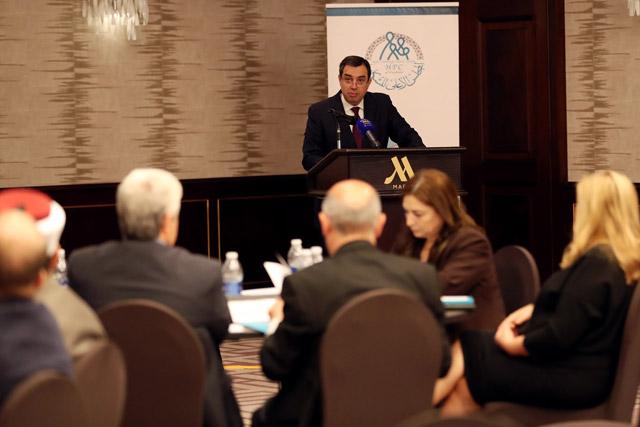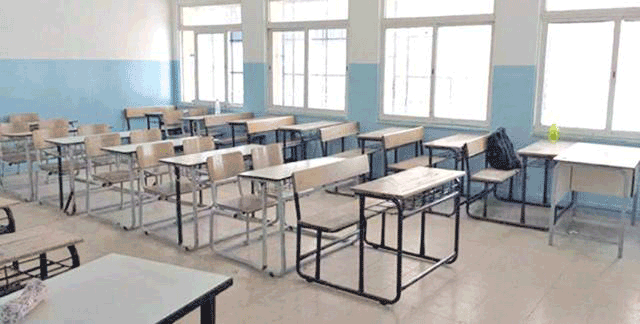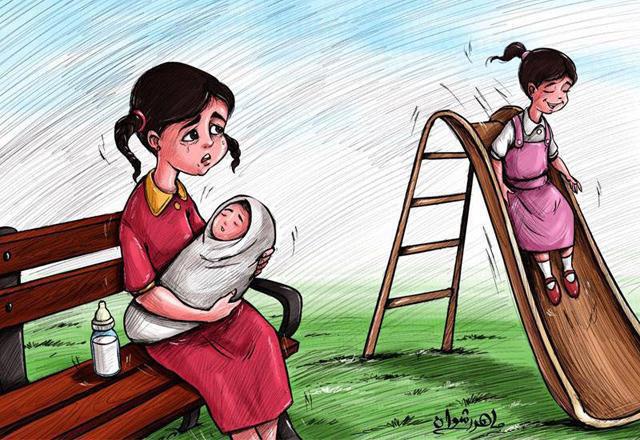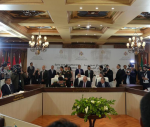You are here
Marriage of girls under 18 is a reproduction of poverty, ignorance and disease — Fakhoury
By JT - Jul 31,2017 - Last updated at Jul 31,2017

Planning and International Cooperation Minister Imad Fakhoury attends the launch ceremony of the study ‘Marriage of minors in Jordan’ in Amman on Sunday (Photo courtesy of Planning and International Cooperation Ministry)
AMMAN — Planning and International Cooperation Minister Imad Fakhoury on Sunday condemned child marriage as “a reproduction of poverty, ignorance and disease”, according to a ministry statement.
During the launch ceremony of the study “Marriage of minors in Jordan” on Sunday, Fakhoury said that the study aims to highlight the extent of early marriage among Jordanians and non-Jordanians, to identify its causes and effects, and consult specialists to reach proposals that will contribute to combating the negative phenomenon.
The minister commended the study as a “remarkable” effort of the Higher Population Council, the Department of Statistics, the National Committee for Women Affairs and the National Council for Family Affairs, the statement said.
“The marriage of girls under the age of 18 is a reproduction of poverty, ignorance and disease for themselves and their children,” Fakhoury said.
New regulations recently issued by the Cabinet to regulate the legal age for early marriage for girls have drawn criticism from activists and women groups in Jordan, with many describing it as a “step backwards”.
The regulations replace a previous legislation issued in 2011 that specified the age of marriage for boys and girls along with other matters related to the marriage of youngsters. In 2002, several changes were made to the Personal Status Law including raising the legal age of marriage for men and women to 18 from 15 for women and 16 for men, but the changes still allowed exceptions.
The new regulations addressed the exceptions of allowing the marriage between the age of 15 and 18. They included provisions that allow a maximum 15-year, and less, age difference between the husband and the wife, provided that the would-be husband is not married and that marriage would not prevent the girl from pursuing her education.
Under the suggested law, the judge will have the authority to decide if tying the knot to girls between 15 and 18 would be in their best interest and permit the registration of the marriage contract.
The court is also entitled to explain to the girl that she has the right “to place conditions that will be to her benefit”.
The regulations also stipulated that the newlyweds should present a certificate that they both attended a workshop on marriage beforehand, organised by the Iftaa Department.
The planning minister, who is also President of the Higher Population Council, stressed the negative health, social and psychological effects of early marriage and the potential risks of subsequent pregnancy.
The marriage of minors has serious economic effects on the safety and well-being of families that affect the education and care of children, leading to neglect, displacement, to an environment that generates violence, according to Fakhoury.
The minister outlined a number of reasons behind the marriage of minors including social traditions, the financial situation of the girl’s family, especially in the Syrian refugee community.
The phenomenon requires raising awareness about the negative effects of this type of marriage, the need to provide basic rights including the access to education through non-formal education, as well as supporting and developing reproductive health programmes, Fakoury said.
He called for all concerned institutions to join efforts to raise awareness , and adopt educational and health programmes, the statement added.
To address this phenomenon, Fakhoury said, the plan should include reducing drop out rate of female students and raising the compulsory education to the high school stage. It should entail the preparation and implementation of a comprehensive awareness plan on the marriage of minors, and its negative effects on individuals, families, children and society in general.
Financial support for the families of girls who resort to marry their daughters because of poverty and poor material resources should also be implemented, the minister added, in conjunction with guidance and family education.
The minister also called for the preparation of a national strategy to reduce this type of marriage.
“Last week, I was honoured to head a Jordanian delegation that included representatives of civil society organisations, human, women and youth rights in order to present the Jordan National Voluntary Report, which was prepared in a participatory manner with ‘all’, during the high-level political forum in the UN and in the presence of all member states,” Fakhoury said.
He added that, during the forum, Jordan presented a road map to implement the sustainable development agenda 2030, one aspect of which emphasised the importance of women’s empowerment, equality and gender integration in national development plans and programmes.
The number of Jordanians who married under the age of 18 is 253,155, accounting for 17.6 per cent of the total number of married women, the ministry statement said. As for Syrian girls there are 113,370 married girls, which accounts for 39.5 per cent of married Syrian refugee women.
Related Articles
AMMAN — Over 90 per cent of females married under the age of 18 stated that they had to drop out of schools after tying the knot, a local st
AMMAN — Yemeni activist Nada Ahdal was only 10 years old when her family told her that she would be “tying the knot” with a man over t
AMMAN – Child marriage has repercussions on human development throughout all stages of women’s lives, according to a recent study by the UN



















